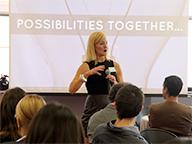School News
—
Social venture competition winner Madécasse, co-founded by Brian McCollum (MBA '07), is featured
—

Excerpt from Poets & Quants -- "McCollum, who graduated in 2007, says the company got a huge boost from participating in Stern’s 2008 Business Plan Competition. 'That was where we got the majority of the resources specific to the company,' he says. 'We got to speak with a whole bunch of different people very quickly and got a lot of feedback that ordinarily would’ve taken months or years to get.'”
School News
—

Excerpt from Poets & Quants -- "McCollum, who graduated in 2007, says the company got a huge boost from participating in Stern’s 2008 Business Plan Competition. 'That was where we got the majority of the resources specific to the company,' he says. 'We got to speak with a whole bunch of different people very quickly and got a lot of feedback that ordinarily would’ve taken months or years to get.'”























